Comité de rédaction
Dr B. Kiefer, rédacteur en chef ; Dr G. de Torrenté de la Jara, Pr A. Pécoud, Dr P.-A. Plan, rédacteurs en chef adjoints ; M. Balavoine, rédacteur.
Secrétaire de rédaction
Chantal Lavanchy : chantal.lavanchy@medhyg.ch
Conseil de rédaction
Dr M. S. Aapro, Genolier (Oncologie) ; Pr A.-F. Allaz, Genève (Douleur) ; Dr S. Anchisi, Sion (Médecine interne générale) ; Pr J.-M. Aubry, Genève (Psychiatrie) ; Pr C. Barazzone-Argiroffo, Genève (Pédiatrie) ; Pr J. Besson, Lausanne (Médecine des addictions) ; Pr F. Bianchi-Demicheli, Genève (Médecine sexuelle) ; Pr T. Bischoff, Lausanne (Médecine interne générale) ; Pr W.-H. Boehncke, Genève (Dermatologie) ; Pr. G. Bondolfi, Genève (Psychiatrie de liaison) ; Pr G.-D. Borasio, Lausanne (Soins palliatifs) ; Pr H. Bounameaux, Genève (Angiologie) ; Pr T. Buclin, Lausanne (Pharmacologie clinique) ; Pr C. Büla, Epalinges (Gérontologie) ; Pr P. Burkhard, Genève (Neurologie) ; Pr B. Burnand, Lausanne (Médecine sociale et préventive) ; Pr M. Burnier, Lausanne (Néphrologie) ; Pr T. Calandra, Lausanne (Maladies infectieuses) ; Dr A. Calmy, Genève (Maladies infectieuses, sida) ; Pr P.-N. Carron, Lausanne (Médecine d’urgence) ; Pr F. Chappuis, Genève (Médecine des voyages) ; Pr C. Chuard, Fribourg (Maladies infectieuses) ; Pr P. Conus, Lausanne (Psychiatrie) ; Pr J. Cornuz, Lausanne (Médecine de premier recours) ; Pr G. Coukos, Lausanne (Oncologie) ; Pr J.-B. Daeppen, Lausanne (Médecine des addictions) ; Pr J.-F. Delaloye, Lausanne (Gynécologie-obstétrique) ; Pr N. Demartines, Lausanne (Chirurgie) ; Pr J. Desmeules, Genève (Pharmacologie clinique) ; Pr P.-Y. Dietrich, Genève (Oncologie) ; Pr R. Du Pasquier, Lausanne (Neurologie) ; Pr A. Farron, Lausanne (Orthopédie) ; Pr S. Ferrari, Genève (Maladies osseuses) ; Pr P. Fontana, Genève (Angiologie) ; Pr R. Frackowiak, Lausanne (Neurologie) ; Dr J.-G. Frey, Montana (Pneumologie) ; Pr J.-L. Frossard, Genève (Gastro-entérologie) ; Pr C. Gabay, Genève (Rhumatologie) ; Pr P. Gasche Soccal, Genève (Pneumologie) ; Pr J.-M. Gaspoz, Genève (Médecine interne générale) ; Pr J. Gasser, Lausanne (Psychiatrie) ; Pr A. Geissbühler, Genève (Cybersanté et télémédecine) ; Pr D. Genné, Bienne (Maladies infectieuses) ; Pr B. Genton, Lausanne (Médecine des voyages) ; Pr M. Gilliet, Lausanne (Dermatologie) ; Pr A. Golay, Genève (Diabétologie) ; Pr G. Gold, Genève (Gériatrie) ; Pr S. Grabherr, Lausanne (Médecine légale) ; Dr G. Gremion, Lausanne (Médecine du sport) ; Pr G. Greub, Lausanne (Microbiologie clinique) ; Pr I. Guessous, Genève (Médecine ambulatoire) ; Pr J.-P. Guyot, Genève (ORL) ; Pr D. Hayoz, Fribourg (Angiologie) ; Pr D. Hannouche, Genève (Orthopédie) ; Pr M. Hofer, Lausanne (Pédiatrie) ; Pr P. Hoffmeyer, Genève (Orthopédie) ; Pr T. Hügle, Lausanne (Rhumatologie) ; Pr O. Irion, Genève (Gynécologie-obstétrique) ; Pr C. Iselin, Genève (Urologie) ; Pr P. Jichlinski, Lausanne (Urologie) ; Pr P. Jolliet, Lausanne (Médecine intensive) ; Dr F. Jornayvaz, Lausanne (Diabétologie) ; Pr L. Kaiser, Genève (Maladies infectieuses) ; Dr O. Kherad, Meyrin (Médecine interne générale) ; Pr A. Kleinschmidt, Genève (Neurologie) ; Pr O. Lamy, Lausanne (Maladies osseuses) ; Pr C. Lovis, Genève (Sciences de l’information) ; Pr F. Mach, Genève (Cardiologie) ; Pr F. Marchal, Genève, (ORL) ; Pr P. Mathevet, Genève (Gynécologie-obstétrique) ; Pr P.-Y. Martin, Genève (Néphrologie) ; Pr B. Martinez de Tejada Weber, Genève (Gynécologie-obstétrique) ; Pr L. Mazzolai, Lausanne (Angiologie) ; Pr C. Meier, Zurich (Médecine interne) ; Pr J. Menetrey, Genève (Médecine du sport) ; Pr P.-A. Michaud, Lausanne (Médecine de l’adolescence) ; Pr P. Michetti, Lausanne (Gastroentérologie) ; Pr D. Moradpour, Lausanne (Gastroentérologie) ; Pr P. Morel, Genève (Chirurgie) ; Pr O. Muller, Lausanne (Cardiologie) ; Dr F. Narring, Genève (Médecine de l’adolescence) ; Pr L. Nicod, Lausanne (Pneumologie) ; Pr F. Paccaud, Lausanne (Médecine sociale et préventive) ; Pr A. Pechère-Bertschi, Genève (Hypertension) ; Pr A. Perrier, Genève (Médecine interne générale) ; Pr S. Peters, Lausanne (Oncologie) ; Pr P. Petignat, Genève (Gynécologie) ; Pr J. Philippe, Genève (Diabétologie) ; Pr C. Pichard, Genève (Nutrition) ; Dr V. Piguet, Genève (Douleur) ; Pr D. Pittet, Genève (Maladies infectieuses) ; Dr F. Pralong, Meyrin (Endocrinologie) ; Dr G. Praz, Sion (Maladies infectieuses) ; Pr J. Prior, Lausanne (Médecine nucléaire) ; Pr J.-L. Reny, Genève (Médecine interne générale) ; Pr M. Righini, Genève (Angiologie) ; Pr. H.-B. Ris, Lausanne (Chirurgie) ; Pr R. Rizzoli, Genève (Ostéoporose) ; Pr N. Rodondi, Berne (Médecine interne générale) ; Pr L. Rubbia-Brandt, Genève (Pathologie clinique) ; Pr F. Sarasin, Genève (Médecine d’urgence) ; Pr A. Scheen, Liège (Thérapeutique) ; Pr J. Schrenzel, Genève (Microbiologie clinique) ; Pr V. Schwitzgebel, Genève (pédiatrie) ; Pr J. Seebach, Genève (Allergo-immunologie) ; Pr N. Senn, Lausanne, (Médecine de famille) ; Pr P. Senn, Genève (ORL) ; Pr C.-A. Siegrist, Genève (Vaccinologie) ; Pr C. Simon, Lausanne (ORL) ; Pr J. Sommer, Genève (Médecine de famille) ; Pr F. Spertini, Lausanne (Allergo-immunologie) ; Pr F. Stiefel, Lausanne (Psychiatrie de liaison) ; Pr A. Superti-Furga, Lausanne (Pédiatrie) ; Dr M. Suter, Genève (Douleur) ; Dr J. Sztajzel, Genève (Cardiologie) ; Dr R. Sztajzel, Genève (Neurologie) ; Pr J.-D. Tissot, Lausanne (Hématologie) ; Pr F. Triponez, Genève (Chirurgie) ; Pr N. Troillet, Sion (Maladies infectieuses) ; Pr P. Urban, Meyrin (Cardiologie) ; Dr J. Villard, Genève (Allergo-immunologie) ; Pr F. Vingerhoets, Lausanne (Neurologie) ; Dr P. Vogt, Lausanne (Cardiologie) ; Pr P. Vollenweider, Lausanne (Médecine interne générale) ; Pr G. Waeber, Lausanne (Médecine interne) ; Dr G. Wuerzner, Lausanne (Hypertension, néphrologie) ; Pr B. Yersin, Lausanne (Médecine d’urgence) ; Dr G. Zulian, Collonge-Bellerive (Soins palliatifs)
